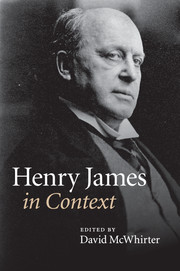Book contents
- Frontmatter
- Contents
- List of Illustrations
- Notes on Contributors
- Preface
- Abbreviations
- Chronology
- Part One Life and career, times and places
- Part Two Historical and cultural contexts
- Chapter 9 Aestheticism and Decadence
- Chapter 10 Authorship
- Chapter 11 Children
- Chapter 12 Consumer culture
- Chapter 13 Cosmopolitanism
- Chapter 14 Courtship, marriage, family
- Chapter 15 Ethics
- Chapter 16 Language
- Chapter 17 Law
- Chapter 18 Manners
- Chapter 19 Media and communication technologies
- Chapter 20 Modernism
- Chapter 21 Money and class
- Chapter 22 Museums and exhibitions
- Chapter 23 Nationalism and imperialism
- Chapter 24 Print culture
- Chapter 25 Psychology
- Chapter 26 Race
- Chapter 27 Realism and naturalism
- Chapter 28 Sexualities and sexology
- Chapter 29 Social sciences and the disciplines
- Chapter 30 Things
- Chapter 31 Time
- Chapter 32 Travel and tourism
- Chapter 33 Urbanity
- Chapter 34 Visual culture
- Chapter 35 Women and men
- Chapter 36 Work
- Part Three Reception
- Further reading
- Index
- References
Chapter 11 - Children
Published online by Cambridge University Press: 05 August 2014
- Frontmatter
- Contents
- List of Illustrations
- Notes on Contributors
- Preface
- Abbreviations
- Chronology
- Part One Life and career, times and places
- Part Two Historical and cultural contexts
- Chapter 9 Aestheticism and Decadence
- Chapter 10 Authorship
- Chapter 11 Children
- Chapter 12 Consumer culture
- Chapter 13 Cosmopolitanism
- Chapter 14 Courtship, marriage, family
- Chapter 15 Ethics
- Chapter 16 Language
- Chapter 17 Law
- Chapter 18 Manners
- Chapter 19 Media and communication technologies
- Chapter 20 Modernism
- Chapter 21 Money and class
- Chapter 22 Museums and exhibitions
- Chapter 23 Nationalism and imperialism
- Chapter 24 Print culture
- Chapter 25 Psychology
- Chapter 26 Race
- Chapter 27 Realism and naturalism
- Chapter 28 Sexualities and sexology
- Chapter 29 Social sciences and the disciplines
- Chapter 30 Things
- Chapter 31 Time
- Chapter 32 Travel and tourism
- Chapter 33 Urbanity
- Chapter 34 Visual culture
- Chapter 35 Women and men
- Chapter 36 Work
- Part Three Reception
- Further reading
- Index
- References
Summary
Maisie turned to Sir Claude, who struck her as having been removed to a distance of about a mile. . . But at the child’s words Mrs Beale had fairly bounded. ‘Come away from me, Maisie?’ It was a wail of dismay and reproach, in which her stepdaughter was astonished to read that she had had no hostile consciousness and that if she had been so actively grand it was not from suspicion, but from strange entanglements of modesty . . . Maisie surveyed – for the idea of a describable loss – the immensity of space.
(N-4, 641–2)This arresting moment in What Maisie Knew – where emerges, arguably, the only ‘moral sense’ worth mentioning – is startling, not least, because it makes us realize that we, like Maisie, have failed to consider Mrs Beale’s perspective: it offers a moving intimation of all the many worlds that we not only do not, but cannot, consider as we go about our lives, if only because our perspective is not infinite. Until this moment, Mrs Beale has registered only as the mirror image of Maisie’s desires; these ‘strange entanglements of modesty’ intimate motives not simply unopposed but, more radically, unrelated, to Maisie’s imaginings or yearnings. No less striking, neither the novel nor Maisie pursues the revelation beyond this mere registered intuition of another perspective. In this novel of (ostensible) development, here is a realization that is neither the culmination of a narrative nor the beginning of future insight: a crucial epiphany – and a strangely unassimilable hiatus.
Not least important is its potential to remove ‘perspective’ from a developmental narrative. The dominant reading of Maisie might not need rehearsal: the child’s limited understanding is captured by a narrative ascesis whose gradual eclipse represents the child’s expanding perspective – until it corresponds with our own, ‘adult’, view. This moment suggests, however, that limitation is not the child’s special provenance; rather, to have a perspective at all is to be limited. The novel does not progress from limitation to an increasingly expansive view: it moves from one form of blindness to another.
- Type
- Chapter
- Information
- Henry James in Context , pp. 115 - 125Publisher: Cambridge University PressPrint publication year: 2010
References
- 1
- Cited by



